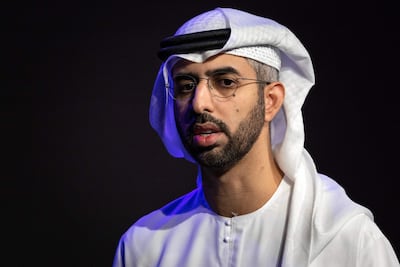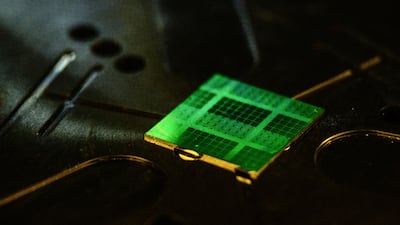Live updates: Follow the latest on Trump's Gulf trip
UAE and US officials have been "actively engaged" in the lead-up to President Donald Trump’s visit on Thursday in hopes of advancing a broad artificial intelligence and technology partnership, a source told The National.
Another source familiar with the US side confirmed that efforts are under way to try to finalise a deal. "There’s a de-hyphenation between technology, energy and geopolitics in the Middle East … it's a watershed moment," the source explained.
The potential deals come one week after Mr Trump said his administration might soon change a controversial chip export policy that some say stifles the AI aspirations of countries in the Middle East and elsewhere.
Although there are few details from US and Emirati officials about what a deal might look like, global trends in recent months related to the burgeoning AI sector offer potential clues about what is helping to grease the wheels of AI discussions between the UAE, the US and other countries Mr Trump is visiting.
AI and energy grids
Data makes AI chatbots, transcription tools and image-generation software possible. Vast data centres are needed for any country that wants to be a player in the AI space.
Data centre expansion, however, is beginning to be a burden on energy grids all over the world. That is where Gulf countries such as the UAE, with economies that have traditionally been dependent on energy production, can provide unique insights.

Mohammed Soliman, senior fellow at the Middle East Institute and technology adviser at McLarty Associates, said the energy needed to fuel AI aspirations gives the UAE and Saudi Arabia leverage.
"I think the real bottleneck for AI is energy," Mr Solimon said. "So what are those countries [UAE and Saudi Arabia] offering? They're offering a quick, massive build-up of AI infrastructure that's able to offer computing as a service to nations around the world."
The UAE's energy offerings make it an attractive place for AI investment. In 2024, the fourth and final unit of the Barakah nuclear power plant was connected to the UAE power grid, making it the largest single source of clean electricity in the Middle East. Earlier this year, the UAE also launched what was described as the world’s first facility that can provide renewable energy at scale around the clock.
With that project, Abu Dhabi clean energy company Masdar plans to combine 5 gigawatts of solar capacity with 19 gigawatt hours of battery storage to produce 1 gigawatt of “uninterrupted clean power”. With those endeavours, among others, Mr Soliman said the region is ripe to help push the envelope on AI development.
UAE built-in advantages
Mr Soliman also pointed out that the UAE, because of its early interest in AI, has an advantage when it comes to striking sizeable deals with the US.
"They were among the first in the world to name a Minister of AI and their sovereign wealth fund put money into chips so many years ago," he said, referring to GlobalFoundries, the semiconductor manufacturer owned by Abu Dhabi’s Mubadala Investment Company.

The UAE's relationships with US technology giants like Microsoft, Nvidia, Google and most recently Cisco are also helping to pave the way for a potential deal to be finalised during Mr Trump's visit.
In 2019, the UAE was among the first countries to open a university dedicated to AI, the Mohamed bin Zayed University of Artificial Intelligence.
The UAE has also created several large language models, including Jais, along with the Jais Chat mobile app, which is proficient in both Arabic and English.
Saudi Arabia makes progress
Although Saudi Arabia's interest in AI does not stretch as far back as that of the UAE, it is working to use its population size, ample investment interest and penchant for expedited deals to try to become a major player in the sector.
Before Mr Trump's arrival on Tuesday, Saudi Arabia’s Public Investment Fund unveiled Humain, an AI endeavour that Saudi officials say will invest in AI factories and data centres in the months and years ahead.
And Nvidia has announced that it will supply the Arab world's largest economy with the necessary graphics processing units and supercomputers to assist with its AI aspirations. Nvidia chief Jensen Huang, OpenAI boss Sam Altman and Palantir chief executive Alex Karp attended the Saudi-US Investment Forum in Riyadh, where Mr Trump gave the keynote speech.
Mr Soliman said that while all this bodes well for Saudi Arabia as it tries to flex its AI muscles, it also bodes well for the wider region.
"The way the public investment fund was able to secure those tech partnerships, and then moved quickly from just being investors to being partners, but overall the region as a whole is moving together and the differences will be minimal in a few years," he said.


